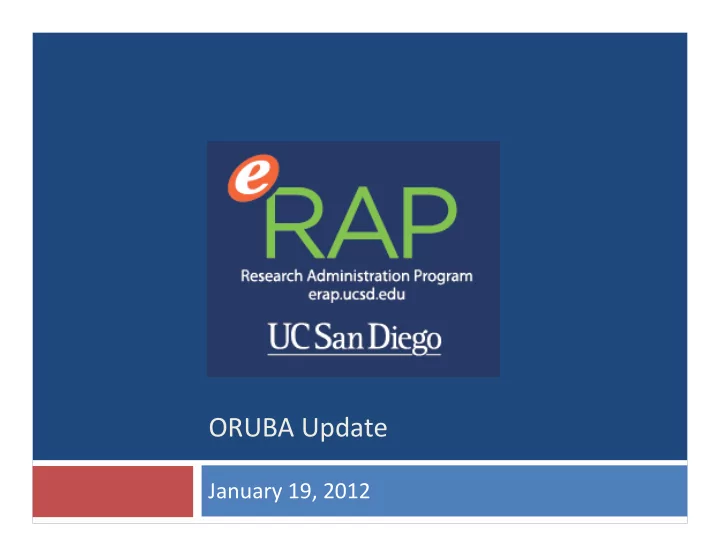

ORUBA Update January 19, 2012
Meeting Agenda eRAP Refresher Huron Report & Scope of eRAP Staffing & resource requirements Project Team Roles & Responsibilities Next steps for Proposal Development & Reporting Projects Discussion
eRAP Electronic Research Administration Program What is eRAP? Campus ‐ wide initiative to implement systems and tools that support improved management by departmental personnel and central offices of sponsored research lifecycle! Goal Continually transform research administration to streamline business processes that minimize the time researchers and research support staff must spend on administrative activities
Why eRAP? UC San Diego consistently ranked among top 10 US research universities Requires significant administrative effort by departments and central offices Uses sub ‐ optimal departmental facing research administrative systems & processes UCSD is behind the times – sponsors and cohorts have made advancements in automation & systems years ago Endorsed Strategy… Proceed to re ‐ engineer the tools & processes that manage the processes that fulfill the lifecycle of our substantial research portfolio
e ‐ Rap Near Term Objectives – Proposal Development solutions Develop and deliver enterprise departmental systems that: provide functionality for department and PI facing proposal preparation & submission processes Workflow, routing and approvals Transparent visibility to status, to ‐ do’s, and processing time improve and standardize processes and systems for departmental ease and usability integrate with central office proposal and award administration requirements integrate processes with accurate reporting for department research administrative requirements
Huron Assessment Conclusion UCSD hired Huron Consulting Group (Huron) to review the current plan and make recommendations that will help increase chances success Huron reviewed plan and concluded: Much work remains to be done to build and implement best in class processes through process review and reengineering Ensure adequate time is dedicated to process review and redesign throughout the eRAP projects Supplement budget for central office and departmental backfill for assignment of experts to the project Develop reporting vision and detailed project plans for development and implementation of enhanced reporting capabilities Updated Budget to address these elements
Major Components of Project & Staffing Resources Initial Phase – Coeus Proposal Development and Reporting Project Management Project Manager & Business Analyst Training & Communication Manager Customer Service Manager Technical Staff Coeus Developers Research Data Management & Reporting Developers Shared resources for ACT operational infrastructure Backfill Positions Central Offices and Departmental support for process improvement, standardization and product design/implementation Includes OCGA, HSSPPO/OCTA, SIO OCGA and OPAFS Huron recommendations emphasized process review and re ‐ engineering focus Consulting, Kuali/Coeus Foundation Membership, Miscellaneous Expenses
PD Project Phases Timeline: July 2011 – June 2013 Requirements Analysis and Process Re ‐ engineering System Implementation and Testing Pilot Training Roll ‐ out Steady ‐ state (care and feeding) Next Phases
Scale of Proposal Development & Reporting Rollout Audience : 6 Central Offices – all staff 137 departments Estimated target population affected: Pilot 60 ‐ 80 Departmental Staff and Central Office users Initial campus ‐ wide rollout: 800 Entire population over 2 years / system lifespan: 1500 ‐ 2000 Initial campus ‐ wide training phase: 600 trainees, some will attend multiple modules for multiple functional responsibilities 90 half day sessions with 12 ‐ 15 participants each 6 half day sessions per week delivered by 2 training teams over 15 weeks Training teams: Training Manager, Customer Care Manager, Central Office SMEs + 1 admin “Steady State” training Provide ongoing training to new employees due to staff turnover and evolving business processes requirements in 137 departments & 6 central offices. Topics include: Intro to Proposal Development (Coeus Lite) Budget preparation Advanced Coeus (Premium) Reporting: Award & Proposal Data
Next Steps ‐ PD Formalize eRAP 1st phase plan Approve budget request for presentation to Campus Budget Committee Continue progress to hire and fill positions Strategize with Central offices and Departments on backfill positions To ‐ Do’s for PD Project Team: Complete PD Requirements Review Requirements & Specifications with UCSD stakeholders to get input and finalize/approve Begin implementation
Next Steps ‐ Reporting Assemble Reporting Team and begin meeting (in progress) Identify current challenges with: Data warehouse: data structure, availability, access, usability, etc. Reporting tools: Querylink, Cognos, homegrown, etc. User training gap analysis Identify reporting needs Develop project plan to improve C&G reporting capabilities
OCGA’S COMMITMENT TO CUSTOMER SERVICE Customer service surveys indicate the campus research community seek confirmation of the following from OCGA: Who will be processing a specific proposal in OCGA? Did OCGA receive my proposal package? Is additional information required so the analysts can effectively review/submit proposals? Better communication between department/ORU staff and OCGA
Proposal Submission Process Email Address proposals.ocga@ucsd.edu Fulfills 4 important objectives Logs proposal within OCGA for tracking Assigns to OCGA analyst Communicates status to customer Records proposal in Coeus (proposal and award data base)
Proposal Log Web Service Changes Page 1 Additional instructions to guide the user of circumstances when proposal log web services does not apply. Pre ‐ award contacts are displayed on the first page of the web service to ensure excellent customer service
Proposal Log Web Service Changes Page 3 The field titled ‘ Proposal Category’ was replaced with ‘ Anticipated Type of Award’ Additional options have been added to the ‘ Anticipated Type of Award’ drop down options New Field Pre ‐ award contacts are ‘Prime displayed on the first page Sponsor’ of the web service to Added ensure excellent customer service
Proposal Log Web Services Changes Page 3 ‘Sponsor Deadline’ Options have been expanded ‘Assigned Office’ Field was added to facilitate the new OCGA Proposal Process.
Proposal Submission Process Correspondence Two emails are associated with the new process Email 1 = confirms that OCGA has received and assigned proposal Email 2 = confirms sufficient supporting documentation is received and the OCGA Analyst is reviewing proposal Information included in emails UCSD Proposal Number PI Name Department Contact Proposal Sponsor OCGA assigned Analyst name, email, and phone number
Questions
Recommend
More recommend